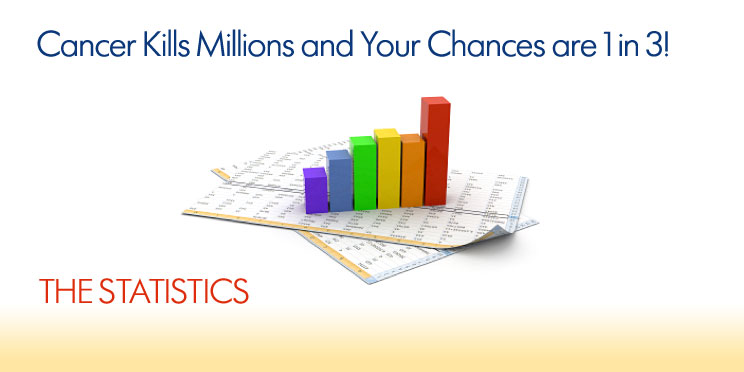
The Basic Statistics on the Problem of Cancer
You have probably already heard of cancer – everyone has! And that fact may be more telling than anything an expert can say on the statistics. Cancer statistics are sad and depressing sets of information. But it is important to know some of the details, accurately. So we present them here for completeness:
 In the latest statistics available, on a yearly basis, cancer killed over 7.6 million people, and accounted for more than 13% of all deaths worldwide.
In the latest statistics available, on a yearly basis, cancer killed over 7.6 million people, and accounted for more than 13% of all deaths worldwide.
 This year, more than 12 million individuals worldwide, including over 2 million people living in the United States, will contract the disease.
This year, more than 12 million individuals worldwide, including over 2 million people living in the United States, will contract the disease.
 The average individual's lifetime risk for getting a cancer is greater than 1 in 3. In fact, it is as high as 1-in-3 for women. And it as high as 1-in-2 for men.
The average individual's lifetime risk for getting a cancer is greater than 1 in 3. In fact, it is as high as 1-in-3 for women. And it as high as 1-in-2 for men.
 One person is diagnosed with cancer every minute, and one person dies from cancer every three minutes.
One person is diagnosed with cancer every minute, and one person dies from cancer every three minutes.
 In the almost 40 years since the National Cancer Act was passed, on December 23, 1971 and the United States government figuratively "declared" war on cancer, many types of cancer remain incurable and the overall death rate from cancer has not decreased appreciably since the 1970s. (#1)
In the almost 40 years since the National Cancer Act was passed, on December 23, 1971 and the United States government figuratively "declared" war on cancer, many types of cancer remain incurable and the overall death rate from cancer has not decreased appreciably since the 1970s. (#1)
 In fact, the death rate for cancer in the U.S., adjusted for population size and age, dropped by only 5 percent from 1950 to 2005.(#2)
In fact, the death rate for cancer in the U.S., adjusted for population size and age, dropped by only 5 percent from 1950 to 2005.(#2)
 According to the World Health Organization's "World Cancer Report 2008",(#3) cancer is expected to surpass cardiovascular disease as the leading cause of death in the world sometime between 2011-14. (#4) (#5)
According to the World Health Organization's "World Cancer Report 2008",(#3) cancer is expected to surpass cardiovascular disease as the leading cause of death in the world sometime between 2011-14. (#4) (#5)
 This year, in the US alone, estimates are that over $100 billion will be spent on direct cancer care; with total cancer care costs estimated to be more than $210 billion.
This year, in the US alone, estimates are that over $100 billion will be spent on direct cancer care; with total cancer care costs estimated to be more than $210 billion.
Clearly there is something wrong with this picture? Cancer remains an unresolved and expensive problem for humans everywhere, irrespective of culture, class, or socio-economic circumstances. There is some good news! Reveal Therapies is a newly formed enterprise that can genuinely help to end the appalling legacy of cancer – and we can start today! Please read on to see how.
Clearly there is something wrong with this picture? Cancer remains an unresolved and expensive problem for humans everywhere, irrespective of culture, class, or socio-economic circumstances. There is some good news! Reveal Therapies is a newly formed enterprise that can genuinely help to end the appalling legacy of cancer – and we can start today! Please read on to see how.